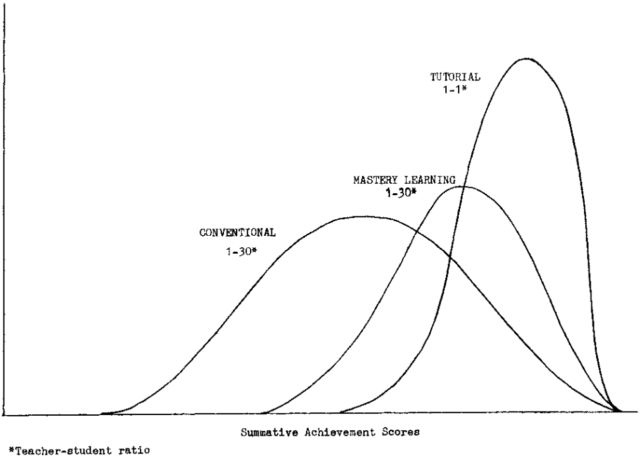A Proposal of Learning-Teaching Technique for Outcome-based Learning with Mastery Learning Approach
By Fergyanto E. Gunawan (fgunawan@binus.edu)
Mastery learning approach seems to possess potential to achieve the ideal tutoring learning method. Previous finding indicated that this approach could result students having a better average performance than the performance of 87% students who learned in traditional approach, or 1-sigma better [1]. However, there is still 1-sigma more to go, as shown in Fig. 1, in order to achieve the learning effectiveness that can be offered by tutorial learning approach.
 |
| Figure 1: Achievement Distribution for Students under Conventional, Mastery Learning, and Tutorial Instruction [1] |
Meanwhile, outcome-based education has become a global trend particularly for undergraduate course of study in engineering. It was considered as one of the five major shifts in 100 years of engineering education [2]. The approach is based on sound educational principles and provides a robust framework for students to acquire the necessary fitness to practice [3], despite of some criticisms particularly in Western Australia [4] and South Africa[5].
This short article offers a learning-teaching technique using mastery learning approach in an outcome-based education setting.
In 2011, we administered a test to understand our student learning style. The index of learning styles test was the instrument developed by Richard M. Felder and Barbara A. Soloman of North Carolina State University. As shown in Fig. 2, the results indicated that majority of the students, nearly 70%, were active learners. The students having this learning style tend to process teaching material actively such as involving in problem solving, application of teaching material, or explaining to others.
 |
| Figure 2: Distribution of Our Students Learning Styles |
This type of learning style matches very well with teaching-learning strategies in mastery learning approach advised by Bloom [1]. The strategy involves providing students with learning tasks and obliging their involvement. The tasks should be designed to compel students to retrieve a delivered lecture. According to Karpicke and Blunt [6], retrieval practices produces more learning than a number of other studying techniques. We also found that grading those tasks to be an effective means. In addition, Bloom also advised a small group learning involving 1--3 students such that students that encounter difficulties can easily and quickly obtain support from their colleagues.
Based on those considerations, we wish to propose the following teaching-learning technique that suitable for outcome-based education. For each teaching-learning session, we recommend the lecturer to start by discussing the relevant learning objectives (LOs). The lecture may rephrase those LOs into question and provide to students in form of quizzes, which can later be utilized as a kind of formative test and/or summative test. Then, the lecturer delivers the session to address those LOs.
The students will be asked to retrieve the given lecture and answer the quizzes. Finally, the lecture should quickly evaluate the student responses and provide a direct corrective feedback; a timely manner feedback is crucial.
We have evaluated the above approach for the last two years and found that the majority of our students showed enormous positive responses. One of the students left the following comment:
Cara pengajaran dosen memberikan pertanyaan di awal perkuliahan, sehingga mahasiswa memperhatikan materi yang diberikan dan menemukan tujuan pembelajaran harap dipertahankan.
We have briefly discussed a teaching-learning technique that suitable for outcome-based education on the basis of mastery learning approach to achieve a high level of learning.
References
- Benjamin S. Bloom, Educational Researcher, 13(6):4—16, 1984
- Jeffrey E. Froyd et al., Proc. of the IEEE, 100:1344—1360, May 2012
- Margery H. Davis, Outcome-based education, JVME, 30(3):227—232, 2003
- ABC News. WA scraps most of controversional education system, January 22, 2007. URL http://www.abc.net.au/news/2007-01-22/wa-scraps-most-of-controversial-education-system/2177546. Retrieved on May 17, 2013
- Times Live. OBE’s cost too high to calculate among SA’s young people, July 7, 2010. URL http://www.timeslive.co.za/opinion/editorials/article538849.ece/OBEs-cost-too-high-to-calculate-among-SAs-young-people. Retrieved on May 17, 2013
- Jeffrey D Karpicke and Janell R Blunt, Science, 331(6018):772—775, 2011
